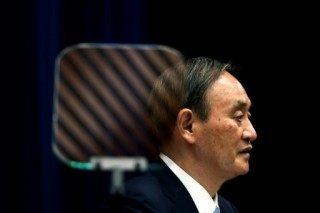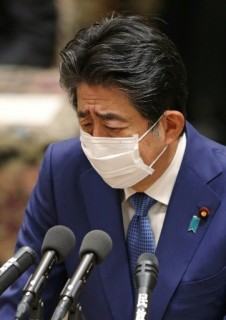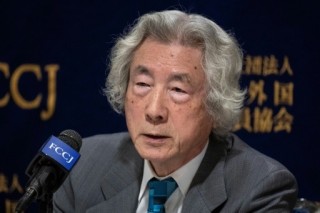Loading
Search
▼ Suga's One-Year Term Recalls Japan's Revolving Door Era
- Category:Other
After a year in office, a prime minister declares defeat and resigns. For a while in Japan, it was almost an annual tradition, and some wonder if it's making a comeback.
The catalyst? Prime Minister Yoshihide Suga's shock announcement that he won't contest this month's ruling party leadership, meaning someone else will be leading the Liberal Democratic Party into general elections this year.
Since World War II, only five politicians have hung onto the prime minister's office for five years or longer.
After Yasuhiro Nakasone left office in 1987, Japan went through 10 prime ministers -- including one who lasted just two months.
The revolving door came to a halt in 2001 when populist Junichiro Koizumi came to power, lasting for five years.
But it was set in motion again with his departure in 2006, and the country then cycled through six prime ministers in the following six years.
It was only when Shinzo Abe took another run at the job after a disastrous first one-year term that some stability was restored.
The catalyst? Prime Minister Yoshihide Suga's shock announcement that he won't contest this month's ruling party leadership, meaning someone else will be leading the Liberal Democratic Party into general elections this year.
Since World War II, only five politicians have hung onto the prime minister's office for five years or longer.
After Yasuhiro Nakasone left office in 1987, Japan went through 10 prime ministers -- including one who lasted just two months.
The revolving door came to a halt in 2001 when populist Junichiro Koizumi came to power, lasting for five years.
But it was set in motion again with his departure in 2006, and the country then cycled through six prime ministers in the following six years.
It was only when Shinzo Abe took another run at the job after a disastrous first one-year term that some stability was restored.
He went on to become the country's longest serving prime minister and resigned only after suffering a recurrence of an intestinal illness.
The reasons for the short-lived premiers varied, including the nation's busy election calendar, fickle public opinion, and constant power struggles within political parties.
When Abe's first term ended after just a year, he was replaced by Yasuo Fukuda, who stepped down after a brief term as the opposition gained strength.
He was followed by LDP veteran Taro Aso, but he lost office when the party was ousted from government and the opposition took control.
But even switching parties had no effect on prime ministerial longevity, with the opposition ditching its first leader after nine months, and his successor Naoto Kan only hanging on for 15.
Kan presided over the deterioration of ties with China and left office under a cloud over the handling of the Fukushima disaster.
And his replacement Yoshihiko Noda was plagued by scandals, policy flip-flops and further souring ties with China, and the party lost power in 2012, with Abe becoming prime minister.
With Suga's departure and the uncertainties created by the pandemic, the turbulence of old could return.
"It's certainly a risk," said Corey Wallace, an assistant professor at Kanagawa University who focuses on Japanese politics and international relations.
"I completely can imagine a situation where we do go through a few years (of revolving prime ministers) as things like the pandemic continue to throw up surprises," he told AFP.
But he pointed out that Suga came to power in exceptional circumstances, with the pandemic raging and without membership in one of the party's power base factions.
The reasons for the short-lived premiers varied, including the nation's busy election calendar, fickle public opinion, and constant power struggles within political parties.
When Abe's first term ended after just a year, he was replaced by Yasuo Fukuda, who stepped down after a brief term as the opposition gained strength.
He was followed by LDP veteran Taro Aso, but he lost office when the party was ousted from government and the opposition took control.
But even switching parties had no effect on prime ministerial longevity, with the opposition ditching its first leader after nine months, and his successor Naoto Kan only hanging on for 15.
Kan presided over the deterioration of ties with China and left office under a cloud over the handling of the Fukushima disaster.
And his replacement Yoshihiko Noda was plagued by scandals, policy flip-flops and further souring ties with China, and the party lost power in 2012, with Abe becoming prime minister.
With Suga's departure and the uncertainties created by the pandemic, the turbulence of old could return.
"It's certainly a risk," said Corey Wallace, an assistant professor at Kanagawa University who focuses on Japanese politics and international relations.
"I completely can imagine a situation where we do go through a few years (of revolving prime ministers) as things like the pandemic continue to throw up surprises," he told AFP.
But he pointed out that Suga came to power in exceptional circumstances, with the pandemic raging and without membership in one of the party's power base factions.
Wallace said he was "a little bit more bullish than others" on the subject and that a stable leader could emerge particularly once the pandemic starts to recede.
"What was unfortunate for him (Suga) was that he had to deal with COVID-19," said Mikitaka Masuyama, politics professor of National Graduate Institute for Policy Studies. "That is extremely difficult for anyone in the prime minister's post."
© 2021 AFP
"What was unfortunate for him (Suga) was that he had to deal with COVID-19," said Mikitaka Masuyama, politics professor of National Graduate Institute for Policy Studies. "That is extremely difficult for anyone in the prime minister's post."
© 2021 AFP
- September 5, 2021
- Comment (0)
- Trackback(0)




